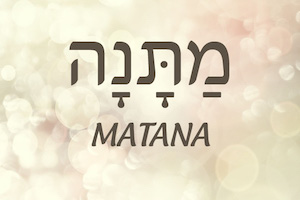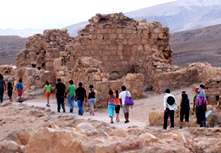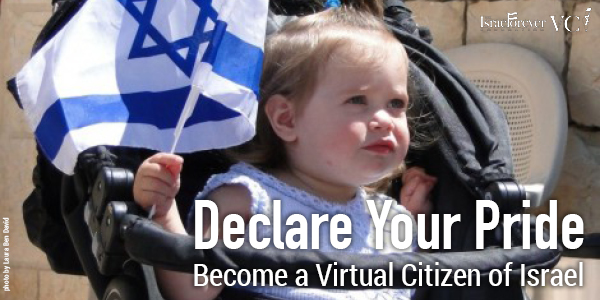Tzedakah Versus Matana: The True Meaning of Giving
By Izzy Sakhaie

Before heading to Israel my uncle gave me a mission to fulfill. He handed me 3 envelopes, each with a certain amount of money, and asked me to give one to 3 different individuals in Israel.
My uncle made it very clear: “Choose the people you feel it is right to give these to but remember, this is not tzedakah (charity), it is a matana (gift).” While it’s definitely important to give charity to those most obviously in need (i.e. a beggar), the task here was to impact someone who wasn’t asking or expecting anything at all.
A month in Israel, and I had not yet given even one of my uncle’s gifts. I was starting to question - How would I know who to give to?
One Wednesday night, walking through the bustling Jerusalem Machane Yehuda Market, I decided to stop and try some homemade granola that a shopkeeper was eagerly offering out. The granola was crunchy and flavorful and the gentleman was so eager, I wanted to purchase a handful. I reached into my wallet, only to find that I had no change and a credit card that he wouldn’t accept. Feeling defeated, I apologized that I couldn’t pay for the granola and turned to walk away. Then to my surprise, the shopkeeper reached out to give me the bag of granola, asking me to take it at no charge. I insisted that I couldn’t and smiled while turning to walk away again. He persisted with an enthusiasm that was impossible to turn down until I shyly took the bag, thanking him profusely.

Machne Yehuda by Forest Rain
As I walked away, I quickly recalled that I had one of my uncle’s gifts, the matanot, in my bag. This man, a stranger had been willing to freely give to me. Now I had an opportunity to give to him. Hesitantly, I turned back, ready to give this gentleman one of the envelopes, afraid that he would not understand, and would refuse to accept.
Using my non-existent Hebrew skills and mumbling the word matana, I handed him the envelope.
Confused at first, a friend of his explained what happened and he began smiling from ear to ear asking if he could open it. I said of course, but began walking away, not wanting to embarrass him once he saw what was inside.
As I turned to look over my shoulder, I could see him glowing and thanking me with a simple nod of his head.
In Hebrew the way words are constructed convey meaning beyond face value. When we compare the words “tzedakah,” charity, and “matana,” gift, the meaning of giving becomes very clear.
Tzedakah is a compound of the word “justice” and “God”. This implies that charity is giving what is just, what must be given because it is right(eous), because there is a need to amend an unjust situation.
The word “matana”, gift, is a compound of the root “giving” and “God”. This implies that the gifts we give are things freely given, as God gives to us. There is no justice involved in this type of giving, it is not a matter of something that MUST be given to right a wrong but rather things that are given, from the pure and simple desire to give.

While charity is most definitely important, a fundamental element, deeply rooted in the Jewish religion, how often do we give for the pure sake of making someone’s day a little better; for the pure sake of giving and expecting nothing in return? No letter of appreciation, no shout out on a website, no tax return number; not knowing exactly where the money is going - other than to a seemingly honest man. Yes, I’m sure many of us drop our change into a beggar’s hand when we pass him on the street, but even then, it’s being asked of us. We don’t choose to preempt the situation and give that person something he wasn’t anticipating.
The Machne Yehuda shopkeeper didn’t ask me for a thing; on the contrary, he was trying to give me something. He thought he was giving me a bag of granola but he also gave me an opportunity to give a matana, to experience the joy of giving.
I don’t know which of us received more.
Chanukah is the season of giving. Usually we focus on gifts for our loved ones but I hope that we can also use this as an opportunity to look around and impact someone who is maybe too afraid or too humble to ask.
My uncle was able to give a matana from across the Atlantic to a man he never saw nor probably ever will, to a hardworking man, too humble to ask for anything but who will certainly benefit from this extra help.
My uncle gave me a gift as well. He and a simple shopkeeper from Jerusalem taught me the difference between tzedakah and matana, giving because it is just and giving because I can.
I learned that the best kind of matana to give, the most empowering type of giving, is one that combines both charitable giving and gifting. Here there is none of the pity that is often associated with charity, combined with all of the love that comes from a gift freely given.
When we succeed in combining the two we create an opportunity for unparalleled impact.

Izzy Sakhaie graduated from the George Washington University with a major in International Business. She is originally from Great Neck, NY but is currently studying in Jerusalem while also interning with the Israel Forever Foundation.
Recommended for you:
STAY CONNECTED NO MATTER WHERE YOU LIVE
Share your love of Israel as a Virtual Citizen of Israel today!
About the Author








